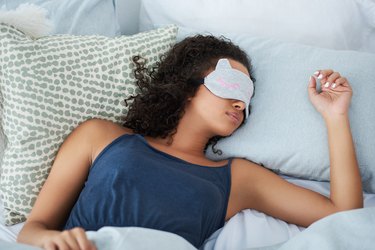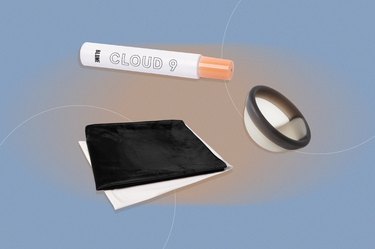
Bloating, cramping, food cravings. These are the usual suspects you've come to expect during that time of the month. While some period symptoms are predictable, others are less obvious.
Here, ob-gyn Sheryl A. Ross, MD, author of She-ology: The Definitive Guide to Women's Intimate Health. Period and She-ology The She-quel: Let's Continue the Conversation, shares some surprising and unusual ways your menstrual cycle can affect your body and overall health (and how to cope).
Video of the Day
Video of the Day
1. It Can Aggravate Asthma
Believe it or not, your monthly menses may cause an asthma flare-up.
"For some, asthma gets much worse right before a period starts, but research is limited to understand this hormonal connection," Dr. Ross says. "One thought is that hormonal changes during and right after a period can exacerbate asthma by decreasing a woman's airflow."
Fix it: If you notice your asthma flares up when Aunt Flo comes to town, talk to your doctor.
"Oral contraception, which regulates hormonal cycles, may help those who get period-related asthma attacks," Dr. Ross says.
Maintaining a healthy weight is also important for hormones as well, she adds.
2. It Can Inflame Irritable Bowel Syndrome (IBS)
While gastrointestinal issues are common during your menstrual cycle (hello, period farts), people with irritable bowel syndrome (IBS) may struggle with even more gut-related symptoms.
"The most common bowel change is diarrhea," Dr. Ross says. "It's thought to be caused by the release of certain chemicals, primarily prostaglandins and progesterone."
These disruptive prostaglandins make the intestines and uterus contract, causing diarrhea (and menstrual cramps) the first three days of your period, she explains.
Adding fuel to the fire, "an increase in the hormone progesterone causes bloating, diarrhea and constipation, often upsetting those with IBS," she says.
Fix it: "The best way to treat these annoying intestinal symptoms includes eating a healthy, fiber-rich and colorful diet, exercising regularly and avoiding caffeine, sugar, salt, dairy, spicy foods and alcohol," Dr. Ross says.
"It's also important to manage stress [which can trigger tummy troubles] through relaxation techniques such as mindfulness, yoga and tai chi," she adds.
3. It Can Exacerbate Bladder Pain Syndrome
For some people with bladder pain syndrome, the hormonal changes that come with a period can prompt painful symptoms, Dr. Ross says.
"Bladder pain syndrome (also known as interstitial cystitis) is a chronic bladder condition that causes pain, urinary frequency and urgency unrelated to a bacterial urinary tract infection," Dr. Ross explains.
"It's a complex and complicated condition that is affected by many external triggers, including diet, alcohol and hormonal fluctuations," she says.
Fix it: To reduce your risk of flare-ups, avoid dietary triggers, including caffeine, alcohol, spicy foods, citrus, tomatoes and artificial sweeteners one to two weeks before a period, Dr. Ross says.
"In addition to dietary awareness, helpful lifestyle changes include relaxation techniques, efforts to minimize stress, low-impact exercises, warm sitz baths, loose clothing, bladder training and monitoring of fluid intake," she adds.
4. It Can Trigger Headaches
Your period can also produce a pounding pain in your noggin.
"Hormonal changes trigger many unpleasant symptoms, and headaches are one of them," Dr. Ross says.
Specifically, the dramatic drop in "estrogen and progesterone during the menstrual cycle can worsen headaches, especially migraines," she explains.
In fact, a staggering 60 percent of people assigned female at birth (AFAB) will suffer from menstrual migraines, Dr. Ross says.
Fix it: Fortunately, Dr. Ross says there are many treatment options for menstrual headaches, including:
- Nonsteroidal anti-inflammatory medications (think: ibuprofen)
- Riboflavin
- Coenzyme Q10
- Herbs, such as butterbur and feverfew
- Acupuncture
- Biofeedback
- Relaxation exercises
- Massage
- Sitting in a dark room with an ice pack on your head
"The birth control pill and other hormonal contraception can also help control menstrual headaches," Dr. Ross adds.
5. It Can Worsen Depression and Anxiety
Hormonal changes that happen during your menstrual cycle may also hinder your mental health.
"Premenstrual syndrome (PMS) can make the one to two weeks prior to your period debilitating," Dr. Ross says.
Affecting as many as 80 percent of people AFAB in their reproductive years, PMS is an umbrella term that refers to the collage of symptoms that take place one to two weeks before the start of your menses, according to the Center for Women's Mental Health at Massachusetts General Hospital.
These may include emotional and psychological symptoms such as:
- Anger
- Anxiety
- Depression
- Irritability
- Sense of feeling overwhelmed
- Sensitivity to rejection
- Social withdrawal
A more severe form of PMS, premenstrual dysphoric disorder (PMDD), can cause even greater mood disturbances (including clinical levels of depression or anxiety) and can impair your functioning and quality of life, per UNC School of Medicine.
And if you have a history of depression, anxiety or another underlying mood disorder, the intense hormonal fluctuations that occur during your period can just exacerbate these conditions, according to the Center for Women's Mental Health at Massachusetts General Hospital.
Fix it: Speak with your doctor and a mental health professional, who can help you create an individualized treatment plan and navigate these difficult symptoms.
Possible treatment options for PMS and PMDD include, per the Center for Women's Mental Health at Massachusetts General Hospital:
- Lifestyle changes (limit or eliminate caffeine, sugar, sodium, alcohol and nicotine; get adequate sleep; exercise regularly)
- Nutritional supplements (calcium, vitamin B6, magnesium and vitamin E)
- Herbal remedies (chasteberry and gingko biloba)
- Light therapy
- Psychotherapy and cognitive-behavioral therapy
- Psychotropic medications
- Oral contraceptives
Is this an emergency? If you are experiencing serious medical symptoms, please see the National Library of Medicine’s list of signs you need emergency medical attention or call 911.


